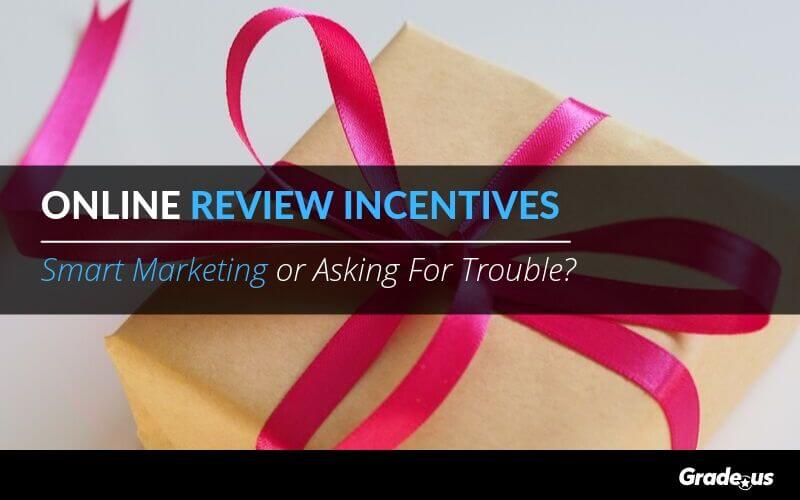Is it so bad to offer online review incentives for great reviews? What’s the harm in saying, “I’ll give you a discount if you rate my business 5-stars on Google”?
Growing up, we’re taught to look both ways before crossing the street and to cross only at crosswalks. We have such rules in place not only to protect pedestrians and drivers but to protect order itself.
Still, that doesn’t stop us (most of us) from jaywalking.
Sometimes striding out across an empty thoroughfare to get from point A to B seems the most sensible route. And maybe it hurts no one, even though it’s technically against the law.
So what does jaywalking have to do with incentivizing online reviews?
Well, jaywalking is one of those “crimes” that, like incentivizing online reviews, is sometimes dangerous, occasionally justifiable, generally ignored and rarely punished. Sure, it can be abusive and injurious, but is it always? And if it isn’t, why not do it?
Table of Contents
Get the Reputation You Deserve with Grade.us
Could incentivizing reviews be a good idea?
That all depends on your definition of “incentive.”
When we use the word incentive we need to define what we mean. The FTC provides us with an objective standard governing what they call, “endorsements.”
“If there’s a connection between an endorser and the marketer that consumers would not expect and it would affect how consumers evaluate the endorsement, that connection should be disclosed.
Say you’re planning a vacation. You do some research and find a glowing review on someone’s blog that a particular resort is the most luxurious place he has ever stayed. If you knew the hotel had paid the blogger hundreds of dollars to say great things about it or that the blogger had stayed there for several days for free, it could affect how much weight you’d give the blogger’s endorsement. The blogger should, therefore, let his readers know about that relationship.”
This seems like common sense.
But it’s also something many businesses choose to ignore. In 2015, the FTC leveled a complaint against AmeriFreight:
“The FTC’s complaint marks the first time the agency has charged a company with misrepresenting online reviews by failing to disclose that it gave cash discounts to customers to post the reviews.”
When people look to online reviews to inform their purchasing decisions, the government wants to make sure that the endorsements are not grossly biased. When the FTC updated their guidelines, they also set out to make an example of a few businesses violating the policies.
How aggressive was AmeriFreight?
- The company provided (positive) reviewers a $50 discount.
- They “increased the cost by $50 if consumers did not agree to write a review.”
- They “provided consumers with ‘Conditions for receiving a discount on reviews,‘ which said that if they leave an online review, they will be automatically entered into a $100 per month ‘Best Monthly Review Award’ for the most creative subject title and ‘informative content’.”
Why did AmeriFreight feel the need to incentivize reviewers?
See for yourself.
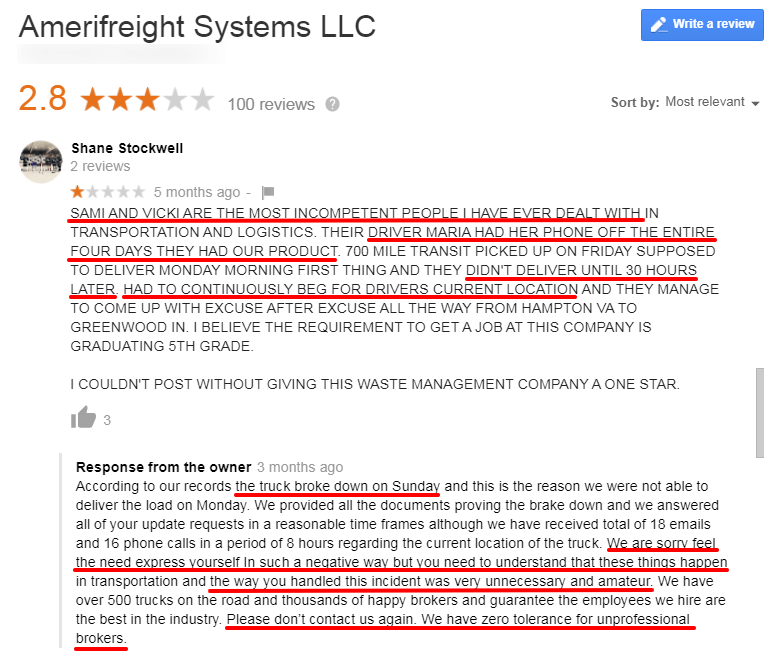
Ah, their situation makes more sense now. They’ve been dealing with a deluge of negative reviews. These reviews have had a negative financial impact on their business. That’s why they felt the need to incentivize (or punish) customers to leave reviews.
Unfortunately their move was unethical.
A note at the bottom of the Amerifreight article explains how the FTC will proceed with these situations in the future:
“The Commission issues an administrative complaint when it has ‘reason to believe’ that the law has been or is being violated, and it appears to the Commission that a proceeding is in the public interest. When the Commission issues a consent order on a final basis, it carries the force of law with respect to future actions. Each violation of such an order may result in a civil penalty of up to $16,000.”
– The FTC on the Consequences of Review Incentives
That’s a big deal!
The Amerifreight case shows that the FTC is serious and focused on pursuing offenders in these types of cases. That makes sense, Amerifreight was a serious offender.
The hidden problems with online review incentives
Incentivizing reviews comes with their own set of headaches and hidden problems. Each of these problems requires a difference (and often complicated) set of solutions. Most of these solutions change the reviewer/reviewee relationship in subtle ways. Others dilute the quality or content of the review.
How do incentives change the reviewer/reviewee relationship?
1. Review incentives create customer mercenaries
Let’s say you’re able to offer an incentive that motivates customers to write a review consistently. Customers write a review, you give them X (and you disclose this to the public as required by law). You’ve now created an unrealistic expectation with customers that’s difficult to shake. Review = reward. No reward, no review.
Here’s an example:
This is Karen Bailey of North Andover, she was escorted out of the restaurant tonight by 3 police officers because she...
Posted by Angelina's Ristorante Tuscan Grille & Wine Bar on Sunday, October 29, 2017
This customer demanded free food. In exchange, the restaurant would not receive a negative review. Nothing like blackmail to increase motivation though, right?
And that’s the problem.
Review incentives train customers to expect punishment or reward.
2. Review incentives attract predators
Incentives create something of a catch 22. If you’re not following the rules outlined by the FTC, you’re breaking the law. If you are following the law, you’re disclosing incentives and endorsements to the public.
The very things customer predators look for.
These predators use tactics like review blackmail, review bombing and fraud to extract cash, discounts and freebies from vulnerable businesses. The frustrating part about this is the fact that these predators can be your own customers or international scammers looking for an easy payday.
“More than 70 one-star reviews were posted online. Business plummeted by more than 40% and 10 people were laid off. Then to make matters worse, [they] received a message through Facebook from someone claiming to be making the posts and demanded $900 dollars in order to get the negative reviews removed.
‘We are seeing extortion cases like this on a daily basis right now,’ said Det. Ed Troyer with the Pierce County Sheriff’s Office.”
Were these unhappy customers?
Nope, they were international scammers from Romania.
That’s right.
“The restaurant then called the police to report the extortion. The Pierce County Sheriff’s Office traced the message to an I.P. address in Romania, where they have no jurisdiction and few options to investigate. Making matters worse, the review sites haven’t taken down the false posts. But other users appear to be counteracting the one-star reviews; more than 200 people have posted 5-star reviews of the business on Facebook.”
This local business was lucky. They did some digging and they were able to identify the cause of the problem. While review platforms wouldn’t take these fraudulent reviews down, they were able to get customers to vouch for them.
Businesses with a poor review portfolio may not be so lucky.
3. Review incentives change customer perception
Let’s say you use what I call the social good incentive. If customers write a review you donate to a charity. Sounds like a good idea, until you decide to stop. You’ll have to manage the optics of the situation carefully. If it’s mishandled customers may form their own misguided conclusions (e.g., you no longer care about supporting the disadvantaged, you’ve become a greedy, for profit company, etc.).
This unrelated example shows the power perception has on your reviews:
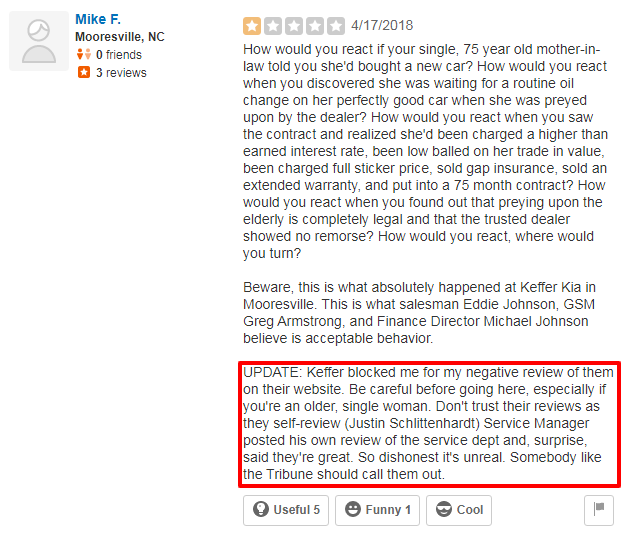
In this review, Mike F, shared his story outlining how a local dealership preyed upon his 75 year old mother. Then, to make matters worse, Mike outed the dealership for reviewing their own business.
Yikes!
Not only has this dealership earned a negative review from this customer but now, prospective customers are much less likely to believe in any of the positive they receive in the future.
They’ve burned that bridge.
Can they recover from the damage? They can, if they’re willing to own their mistake, make drastic changes, and work to build a strong review portfolio. Review incentives create the same perception problem. Once prospects know you compensate customers for a review, the trustworthiness of your entire review portfolio takes a dip.
But why?
Most customers won’t take the time to investigate the truth. Not when there’s an abundance of competitors waiting to take your place. This creates cognitive biases in the minds of your existing customers and potential prospects.
The Bandwagon and Continued Influence effect are two notable examples.
Review site incentive policies
Only a few online review sites have an explicit policy on review incentives. The ones that do tend to discourage incentives, but a few review sites actually encourage them.
Here are 4 of the major sites and how they address the issue:
Google's Review Incentive Policy
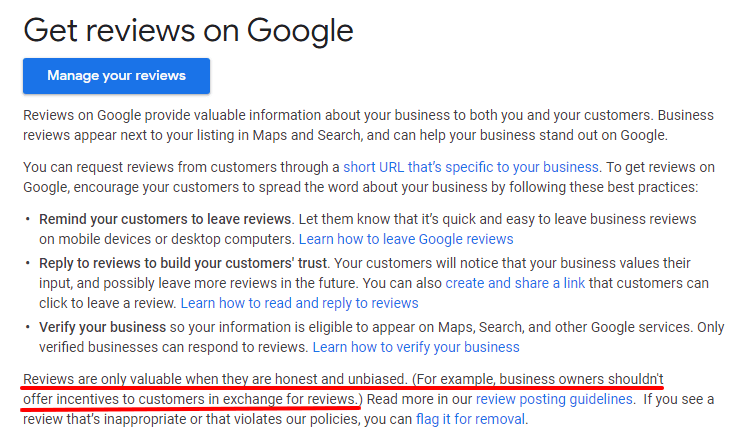
Reviews are only valuable when they are honest and unbiased. (For example, business owners shouldn’t offer incentives to customers in exchange for reviews.) Read more in our review posting guidelines. If you see a review that’s inappropriate or that violates our policies, you can flag it for removal.
Source: Google Support
Google has shown they’re willing to follow through.
A law firm used contests to solicit Google reviews in 2018. Google responded by removing all but one of the reviews in their portfolio.
- Check out our guide on getting Google reviews without incentives
Yelp's Review Incentive Policy
Meanwhile, Yelp’s guidelines are notoriously stringent, prohibiting business owners from so much as asking customers to write reviews:
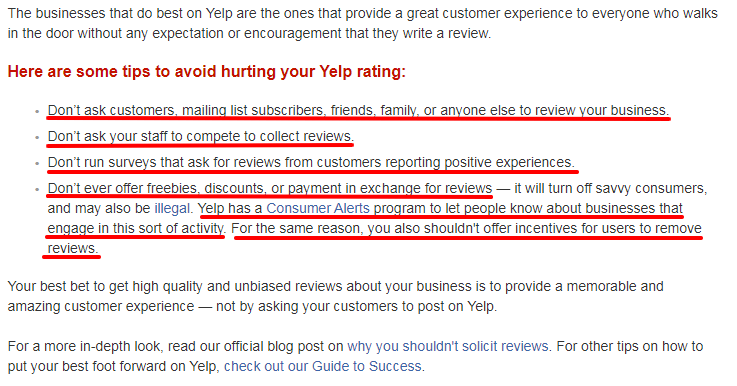
“Don’t ever offer freebies, discounts, or payment in exchange for reviews — it will turn off savvy consumers, and may also be illegal. Yelp has a Consumer Alerts program to let people know about businesses that engage in this sort of activity. For the same reason, you also shouldn’t offer incentives for users to remove reviews.“
Source: Yelp Support
- Check out our guide on managing Yelp reviews without breaking any rules
Facebook's Review Incentive Policy
Facebook’s policy seems to be the most laissez-faire, requiring that reviews be about the product or service and based on personal experience:
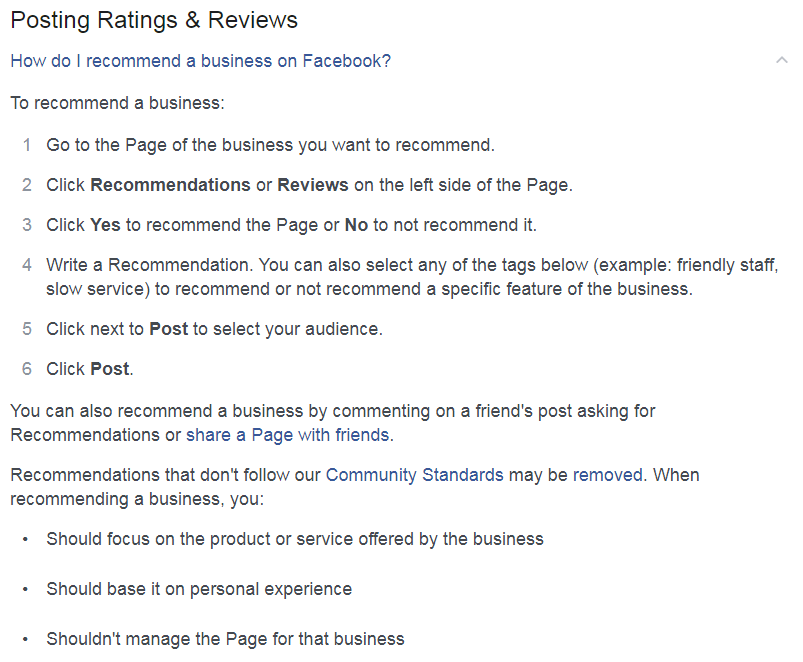
Source: Facebook Support
The Facebook community guidelines focus mostly on reporting abuse, safety, and privacy. They don’t provide many specifics in regards to how they handle review incentives.
- Check out our guide on getting Facebook Recommendations without incentives
TripAdvisor's Review Incentive Policy
TripAdvisor’s explanation, “Why are incentives not okay?” is perhaps the best example of a clear and to-the-point policy:
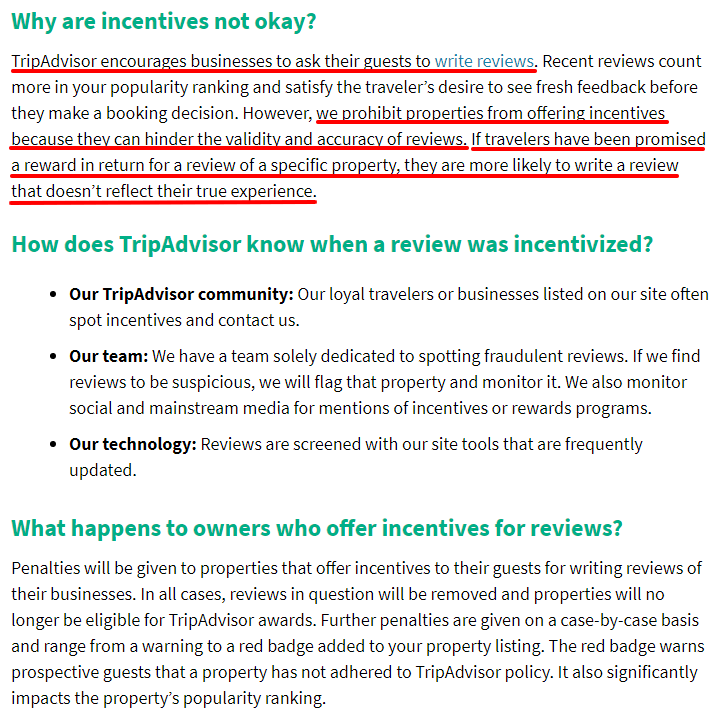
Source: TripAdvisor Support
Does this mean all review platforms discourage incentives?
The surprising answer is no.
- Check out our guide on getting TripAdvisor reviews without incentives
Industry Specific Review Site Incentive Policies

Industry specific providers like ZocDoc explicitly encourage medical professionals to request a review and provide incentives to customers for doing so.
Meanwhile, a site like Avvo, which hosts reviews for lawyers doesn’t explicitly discuss incentives, but lawyers could be prohibited from incentivizing reviews depending on the laws of their state.
Source: Avvo Community Guidelines
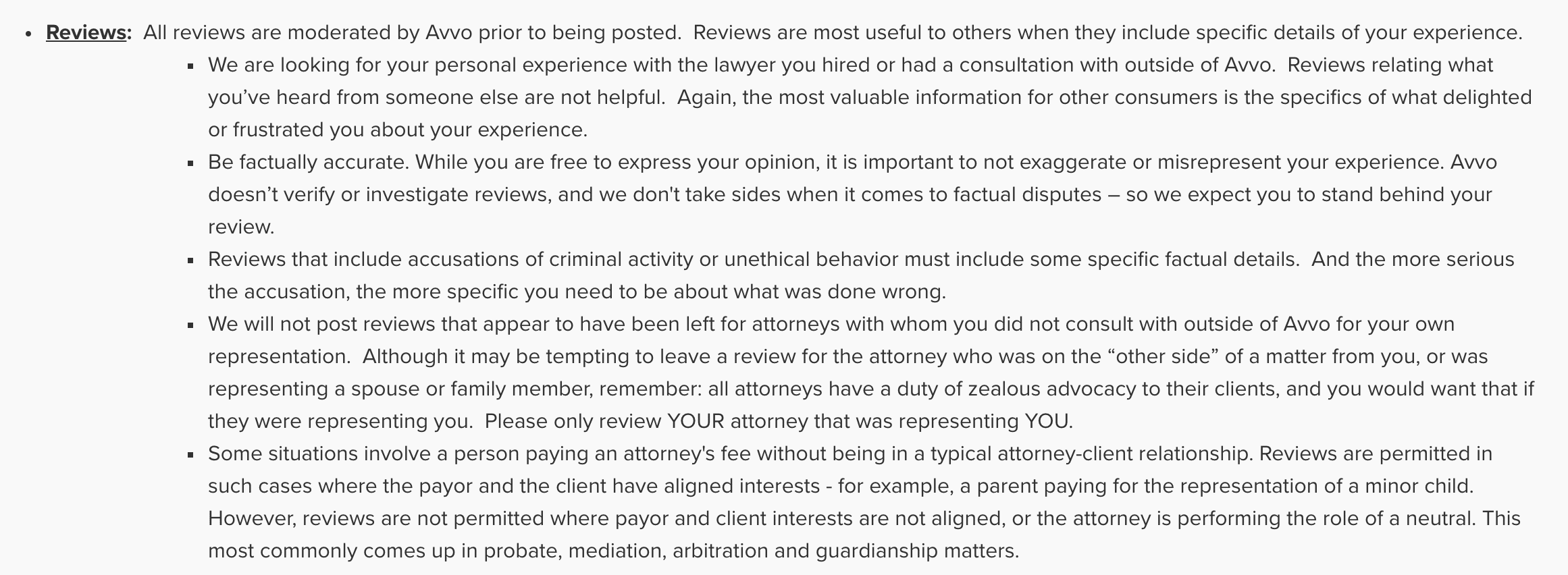
So where do we stand on this?
Is incentivizing reviews a question of ethics or not? If it’s not disclosed, it’s unethical. If it is disclosed, it still violates guidelines set by major review platforms. What does this mean for your local business then? You focus your attention on attracting reviews the natural way.
By delivering exceptional results and tremendous value to your customers.
Grayer Areas Ahead: Are All Incentives Equal?
While the FTC and these mainstream review sites offer a reasonable “consumer protection” argument against companies offering incentives in exchange for reviews, the reality is rarely so black-and-white.
Circling back to the Amerifreight case, the company was targeted for exceptionally egregious violations of consumer trust, including penalizing customers for not reviewing them and attempting to steer the content of the reviews with a “best review” contest. What if their incentive program was a much lower-pressure ask that explicitly rewarded all reviewers: good, bad or indifferent?
Or what about when review sites, eager for more review content, offer incentives themselves, as Yelp does with its “Elite” program and Angie’s List does incessantly with offers of gas cards and other freebies?
Some review sites in the B2B community even encourage businesses to provide their customers incentives to write reviews, knowing full well that it’s a tough ask to get busy professionals to take the time to review a product or service they use at work.
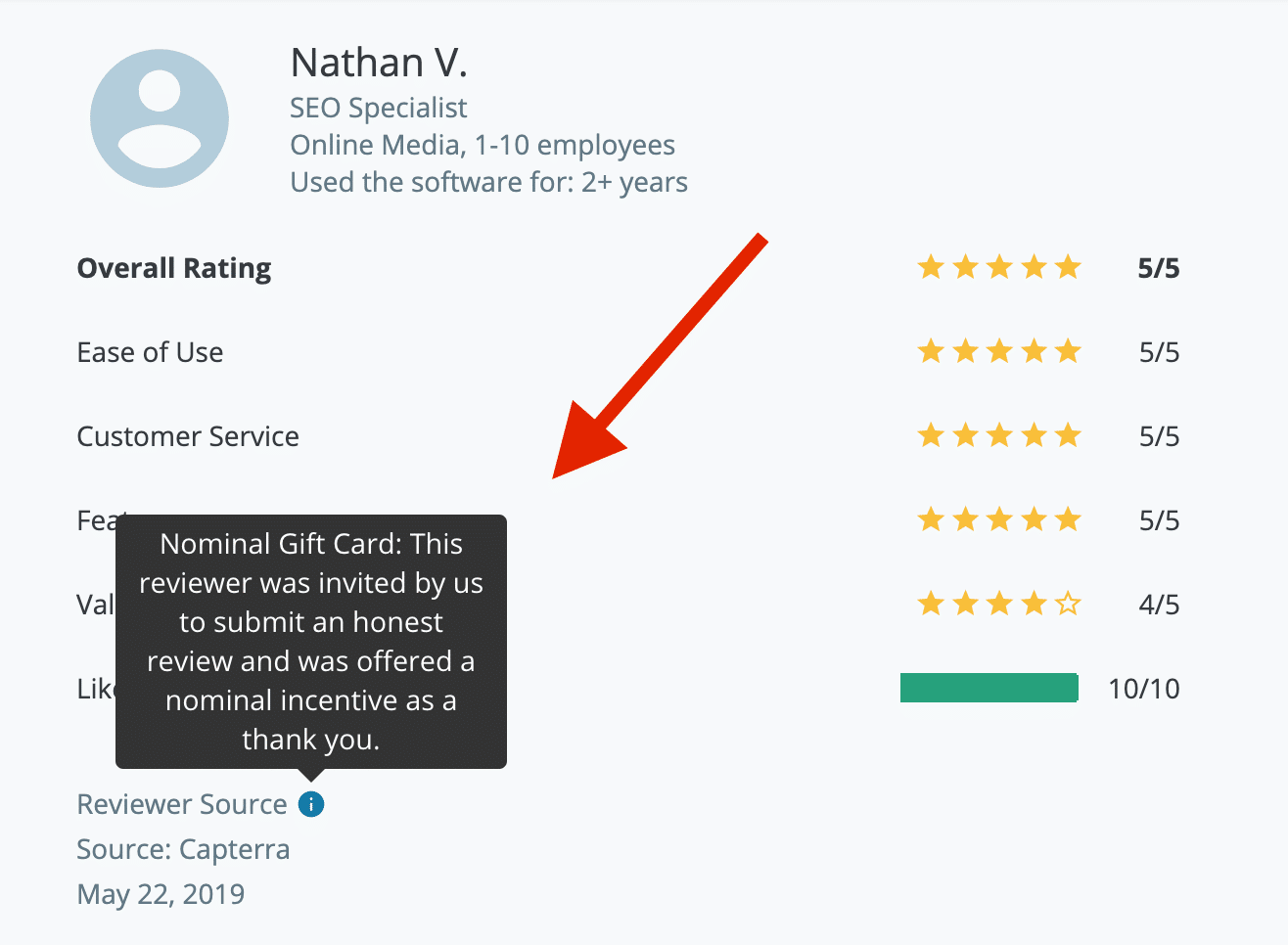
All of these examples point to interesting contradictions and ironies in the prescription against incentivizing reviews. Moreover, they all point to one undeniable fact: incentives work!
Not surprisingly, people are more likely to do something when there’s a reward for it — carrots, once again, for the win.
Walking the line: Alternatives to incentivizing reviews
In the interest of preserving consumer trust in online reviews–and of staying off the FTC’s radar–we at Grade.us never recommend offering incentives in exchange for reviews. So when it comes to acquiring reviews for your own small business or a client’s, what should you do?
For better or worse, the answer comes down to fundamentals: (1) provide a recommendable product or service; and (2) ask for reviews. Of course, you gain an x-factor if you can find ways to surprise and “delight” customers. One of the best ways is to deliver unexpectedly good customer service.
Interestingly, customers have different expectations of service depending on the industry. If you’re a restaurant or in hospitality, your customers will expect attentive and thorough service as the baseline. But if you’ve ever had to call a phone service provider, let’s just say receiving quality service is an unexpected delight.
I remember writing a DealerRater review when I originally wrote this article, praising the salesman who sold me a lease on a new car.

I knew if I didn’t find the right car at the right price, then I most likely wouldn’t write the review. If anything, I still had the stereotype of a pushy car salesman in the back of my head. I connected on the lot with this great rep, who was courteous and empathetic as we went through the process. In the end, he casually mentioned the importance of reviews for his role in the company.
I wanted to write a great review for him. He exceeded my expectations.
Are review incentives ever okay?
It’s common practice to offer a giveaway for completing a survey. However, surveys are a different animal. While the information collected helps the business performing the survey, if it’s influenced by an incentive, it hurts the business only.
Incentivized reviews hurt the public’s trust.
When incentivizing surveys, monetary incentives seems to be the most effective. In fact, the reason to use incentives is to increase the response rate. The risk is that responses are more likely to be motivated by the reward and therefore, expedient and of lower value.
A few types of incentives you could offer in exchange for a survey response:
- Cash incentive
- Coupons
- Rebates
- Donations to a charity of the reviewers’ choice
- Free Product Giveaways
- Informational Digital Giveaways
Of the options listed above, digital giveaways and charity donations seem the least likely to influence your reviewer’s opinion in a way that compromises them. And, of course, should you choose to publish the results of your survey, you’ll want to disclose any offers made to respondents in collecting it.
With review incentives, it's too easy to erode customer trust
I remember as a kid, when my mother needed to run an errand at the bank, I’d get a lollipop from the teller. Imagine that the bank always gave away lollipops, but these days, the bank needs its customers to share its good work. So the bank manager has the tellers not only hand out lollipops but also let customers know how much the bank values and relies upon customer reviews.
Establishing processes to delight customers and then encourage them to share that delight is just good business: no incentive required. In fact, introducing a more explicit incentive can lead customers to revolt. After all, nobody likes to feel bribed.
Still, incentives or not, at the end of the day the business has to give to receive: lollipops, a recommendable product or service, and superb customer service. Exceptional customer service is perhaps the only thing that will differentiate the winners from the losers in the increasingly transparent world of local commerce.
So what’s the verdict in your opinion? Are online review incentives smart marketing or asking for trouble?

